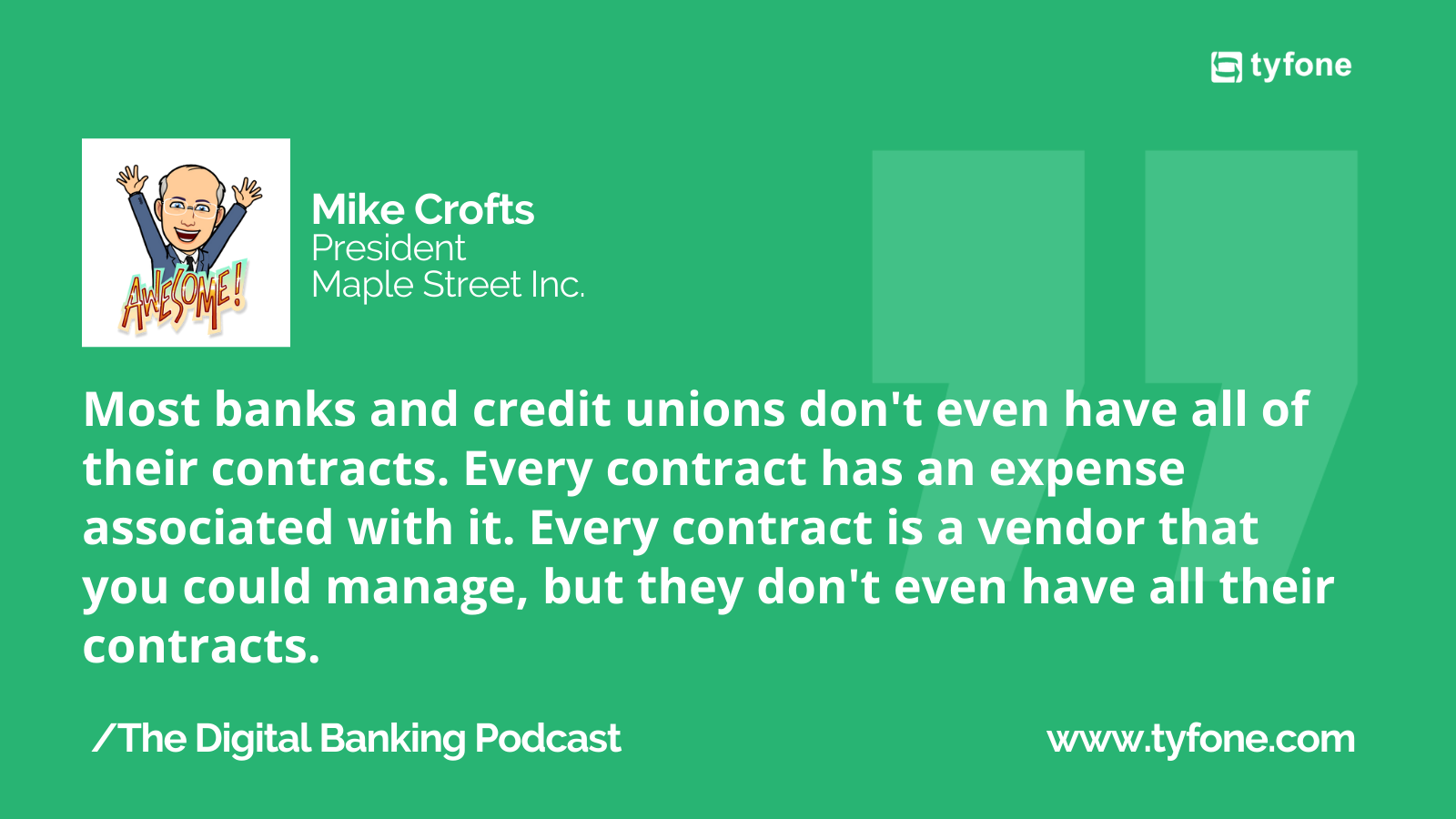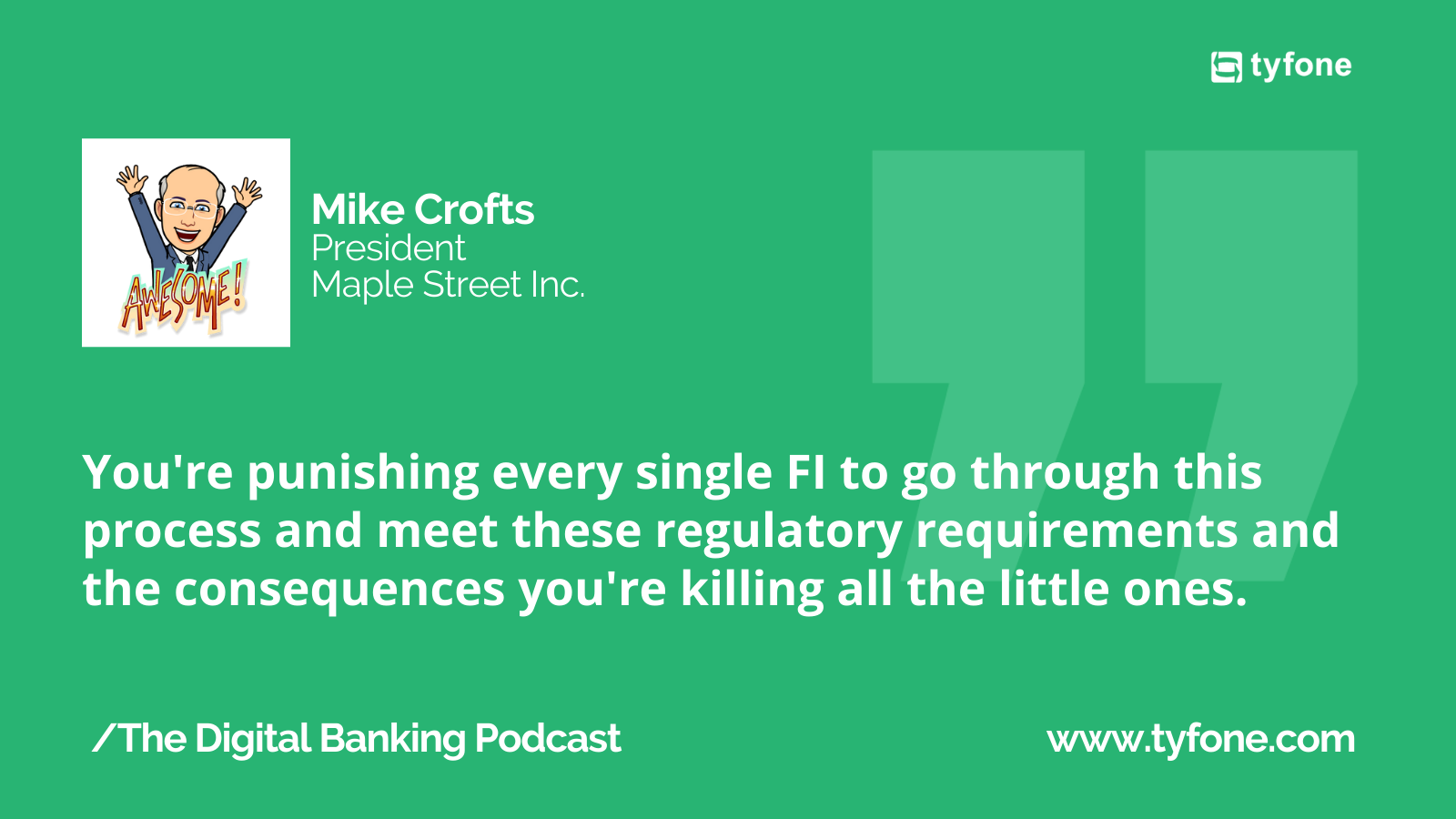How to Negotiate Better Vendor Contracts
- Too many people assume they’re pros at negotiation. But even some of the best leave money on the table when get distracted by too many features.
- Buying a tool doesn’t mean you’ll immediately get the desired results. “Getting access to the feature only opens the door to the possibility of getting the results.”
- Think of a contract as relationship-driven rather than transaction-driven.
The obvious benefit of becoming a negotiation pro is saving money on contracts. Or so a lot of FIs think. On the Digital Banking podcast, MapleStreet Inc’s president Mike Crofts details some of the epic fails in contract negotiations that tell only a part of the story. Many FIs go wrong in not negotiating all the terms of the contract or assuming they’re stuck with the renewal terms. All too often, those terms don’t favor them. It’s easier to renew than evaluate the “why” behind the initial decision to work with that vendor.
Building in better processes and getting more comfortable with pushing back will benefit the financial institution and its consumers. The old way of doing things is due for a shakeup that could make more contracts relationship-focused rather than transaction-focused.
In this episode, Josh DeTar and Mike discuss how to get better at contract negotiations, how to ask better questions to determine what you really need in the first place, and how regulations are shaping the banking industry for smaller credit unions.

Every single vendor is a contract
Too many FIs don’t have a grasp of all their contracts to begin with, which puts them in a really bad negotiating position. They don’t know what they don’t know, and sometimes there’s even friction around fixing that situation if they discover it after the fact. Mike points out that some are leaving thousands or even millions of dollars on the table because they lack a strong strategy for reviewing and negotiating contracts.
“You don’t ever give up a term unless you get something for it. Well, why would you give five years to somebody when you’re not going to get anything for it? You’re going to convince yourself you’re not going to miss the date. Well, sometimes they do, or more likely, it’s going to start creeping up on them. They are going to realize it too late to effectively negotiate any kind of really good deal for renewal and find themselves having to renew,” Mike shares.
Sometimes those FI decision-makers feel like they got a win by negotiating anything positive into the renewal. As he says, “Maybe they get a little something, but they don’t get much. Whenever you sign a contract, the simple fix insists that the renewal term is not more than a year. That’s all you have to do. You fight a little bit, the vendors will give it to you, and you can save yourself a lot of angst and expense down the road. And I believe it’s stupid not to do it.”

Update your process to reflect an outcome-based approach
So many FIs fall short at getting good contract terms because they don’t think about changing the process they use to get and evaluate bids. Instead, according to Mike, most of the decision-makers view the contract as secondary to the process.
Mike notes, “You go through a mechanical process, then go get a couple more bids so that you’ve got your three proposals and those two other vendors, we call them column fodder because they’re just listed in the spreadsheet on the columns to show that you got your three.”
Instead of thinking about what a win looks like for the entire team, the FI representative gets fixated on a certain feature. As Mike says, “They think if I buy that, I’m going to get the results that I want, but there’s an inherent disconnect in that. And the disconnect is if you buy it, does it mean you’re going to get the results.”
Getting access to the feature only opens the door to the possibility of getting the results, but this comes with learning what the tool does, practice using it, and putting in the time to get those results, something that often gets glossed over after the contract is signed.
The way to change this up is to slow down and understand where you are and what you have and need at that point in time. According to Mike, leading with questions like “what features do they have?” is backward. He says, “Honestly, what are we trying to achieve? There’s a whole culture that’s built on asking the right question. And the question is, what’s the problem we’re solving? And you really focus on making sure you’re asking the right question, as opposed to just jumping to conclusions. Once you figure out what is the right question, the answers are pretty easy to get to, but there’s a discipline and a process that goes around that.”
Reclaim your power in the negotiation process
The current contract playbook just doesn’t work. Too many FIs think their only room to negotiate in a new contract is on the money. But ignoring those other terms is usually what ends up costing them more money. There’s power in a negotiation, Mike notes, when the person on the other side of the deal realizes the leverage they have.
Don’t forget aspects like deconversion clauses that define what it will cost the paying party to exit that contrac. Mike says those can be negotiated, and so can renewal clauses, most of which favor the vendor. FIs end up forgetting about the renewal process until it’s coming up too late to do much about it. At that point, plenty of them are afraid of angering their vendor, so they don’t use any leverage at this crucial stage in the process.
As Mike says, “What is fair to ask the vendor is to say, as we’re going through the sales process, I’d like to identify with you what results we are after. And I’d like you, the vendor, to tell me how you can help me get there and what I need to do to make that happen.”
This shifts the RFP process conversation from being features-based to becoming outcome-based instead. It protects FIs from getting locked into contracts with bad terms for features they’ll never use.

